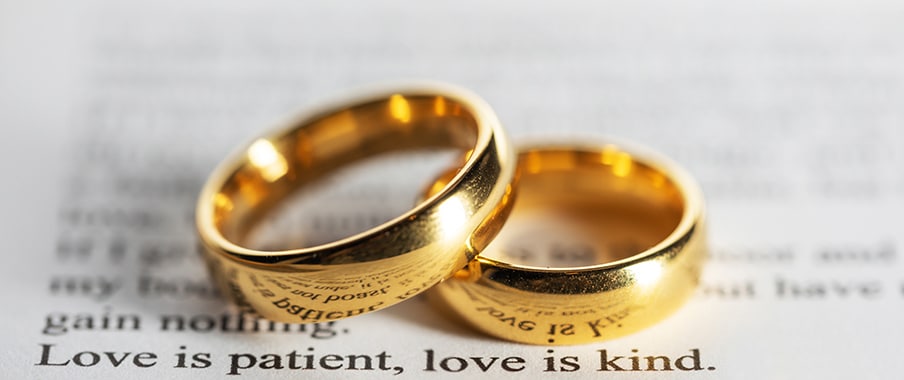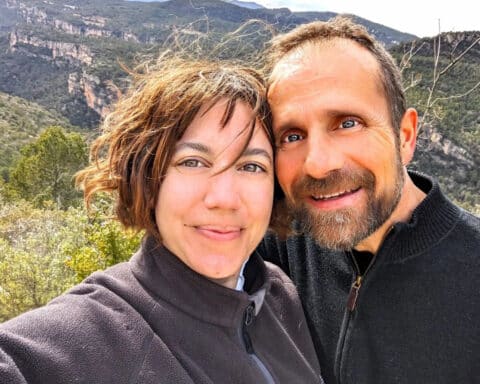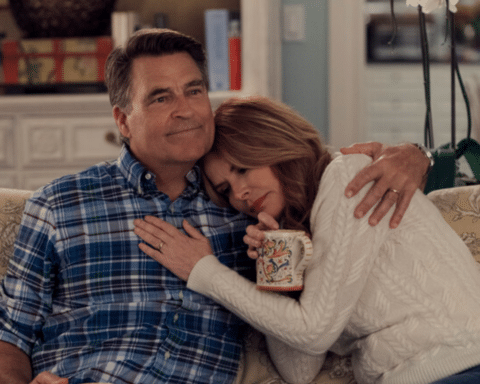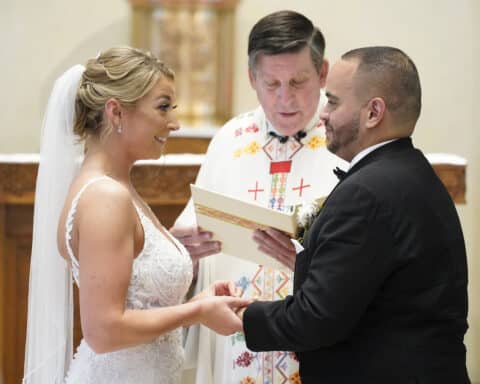Erin Mongold always imagined a church packed with her closest family and friends on the day she would walk down the aisle.
But when the church doors opened on her wedding day this month, the pews were empty. The only people there other than her and the groom were two concelebrating priests, a cantor, an organist and a photographer.
“It was very emotional,” said Mongold, 28, who scaled back her plans for a large wedding because of the coronavirus pandemic. Mongold and her fiance, Chase, decided to get married sooner than their scheduled wedding date rather than risk having to postpone it.
“We wanted to move (the wedding date) up. We wanted to actually be able to get married,” Mongold told Our Sunday Visitor.
Many engaged Catholic couples across the country are in a similar predicament. Bishops everywhere have cancelled public Masses and are following health officials’ recommendations that most gatherings in a church have less than 10 people and that those present observe social distancing protocols and stay 6 feet away from each other.
Some bishops are allowing their pastors to preside at wedding ceremonies, with strict conditions. Other bishops have ruled out weddings altogether — for now — on grounds that limiting them to a handful of immediate family is not feasible.
“We want to ensure that there cannot be any more possible exposure to the virus at one of our Churches in Brooklyn and Queens,” Bishop Nicholas DiMarzio of Brooklyn said in a March 20 press release where he announced that no weddings, as well as funerals and baptisms, would be permitted in church for the time being.
Bishop DiMarzio’s decision — which he said was meant to protect the safety of the local clergy and lay faithful after two diocesan priests tested positive for coronavirus — forced Kristina Mazzeo, 31, of Brooklyn to reschedule her wedding, which was originally set for March 29.
“We had no choice but to postpone,” said Mazzeo, who told Our Sunday Visitor that she would not have wanted a smaller wedding anyway because she has a large family and would have wanted all her relatives to be there.
“Also, we wanted to keep our family’s health first, so we really just had to rule that out altogether,” Mazzeo said.
Changing plans
On March 17, Bishop Michael Duca of Baton Rouge, Louisiana, joined many of his brother-bishops in issuing coronavirus-related guidelines for weddings. He permitted weddings to continue, but with only the bride, groom, celebrant priest or deacon, two witnesses and immediate family, defined as parents, siblings and children.
“We’ve trying to do the best we can to work with the couples, who for many years have dreamed about their wedding and planned it, and who are now kind of coming to grips with the fact that they may not have the kind of wedding they had imagined,” Bishop Duca told Our Sunday Visitor.
As of March 26, Bishop Duca said he was aware that only one local wedding ceremony had been held recently, which he added was a convalidation with two witnesses present. He said most people have postponed their weddings, not so much due to the church’s restrictions but because the reception venues are all closed.
“They were mad at the Church, but now they realize that this is something that the whole community is buying into,” said Bishop Duca, who has advised his priests to only set tentative future dates for weddings because nobody knows for sure when the pandemic will ease.
“I’m going with great caution at the moment,” Bishop Duca said.
In New York, Bishop Edward Scharfenberger of Albany told Our Sunday Visitor that his diocese has also been “playing it by ear” in following the guidelines put out by public authorities. As far as weddings are concerned, that means they are permitted if social distancing is observed and no more than 10 people are present.
“If there were a celebration of a wedding or baptism, it would have to be extremely contained,” Bishop Scharfenberger said.
For most couples, it appears the question of whether to get married in an “extremely contained” church ceremony is a moot point, because the reception halls closing their doors is causing couples to reschedule everything. Mazzeo, of Brooklyn, said she condensed a year and a half of wedding planning into six hours of telephone calls with her vendors.
“It’s very difficult. The wedding industry never stops,” Mazzeo said. “You have to work with everyone’s schedules, to fit in all March, April and May weddings that are being postponed.”
Msgr. Thomas Machalski, the pastor of Sacred Heart of Jesus Church in Bayside, New York, has already worked with 10 couples to reschedule their weddings.
“We’re doing our best to accommodate them, to make a very sad situation a little bit less stressful for them,” said Msgr. Machalski, who told Our Sunday Visitor that the local venue halls have given those couples new dates for sometime in the fall.
“But whether those dates will hold, I don’t think anyone has a clear picture of when this is going to end,” Msgr. Machalski said.
‘Pretty surreal’
In Stillwater, Oklahoma, Father Brian O’Brien, the pastor of St. Francis Xavier Church, told Our Sunday Visitor that he does not have a wedding scheduled until early May. The current guidance from his diocese is that there will be no public Masses until after Holy Thursday on April 9.
“I’m skeptical about whether this will all be over by then. I don’t think it will,” said Father O’Brien, who prepared Erin and Chase Mongold for their wedding, which was originally scheduled for March 28 in Tulsa.
Instead, Erin and Chase Mongold decided to have a small wedding ceremony March 19, the Solemnity of St. Joseph, at Father O’Brien’s church in Stillwater. It was an emotionally wrenching decision, but Erin said they did not want to jeopardize their relatives’ health by inviting them to the church.
Father O’Brien arranged the cantor and organist, and had a couple of women from the parish help Erin get ready for the ceremony. The women opened the church doors for Erin, who wore a white dress and carried a bouquet of flowers. Chase wore a black tux with a boutonniere made by the parish women.
Tears fell down Erin’s eyes as she walked down the aisle. In such a moment, Father O’Brien usually looks around the church to see the proud looks of the bride’s parents, grandparents and close friends.
“And there was none of that,” Father O’Brien said. “She was walking down the aisle by herself, with the groom standing by himself, with no family anywhere. It was pretty surreal.”
Erin said she and Chase hope to have a public vow renewal ceremony with all their family and friends when the pandemic subsides. But reflecting on their simple, intimate wedding ceremony, Erin said she had no regrets.
“It was almost more special in a way,” Erin said, “Because I think it was almost like a metaphor in that no matter what’s going to happen in life, Chase is going to be there for me, even if it’s us against the world, which is what a marriage should be about anyway.”
Brian Fraga is a contributing editor for Our Sunday Visitor.





